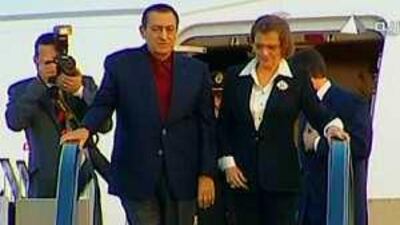CAIRO // The ageing Egyptian president, Hosni Mubarak, is facing growing questions about his ability to rule and who should succeed him as he convalesces at the Red Sea resort of Sharm el Sheikh after more than three weeks spent abroad for surgery. Mr Mubarak, 81, arrived back in his country on Saturday, having spent 24 days in Germany, the longest time he has been away from Egypt since he came to power in 1981.
The president fell ill during a state visit there and had his gallbladder removed on March 6 at Heidelberg University Hospital, where he had been recovering until his return home last weekend. In his absence, the prime minister, Ahmed Nazif, to whom he delegated his power on the eve of his operation, has been roundly criticised for his leadership, and Mohammed ElBaradei, the former head of the UN's nuclear monitoring agency, has continued to forge his opposition movement.
Criticism has also continued to mount against Mr Mubarak's son, Gamal, the man seen by many as the heir apparent to his father's regime. "President Mubarak's health, Gamal's presidential ambitions, which are not approved by all the state's institutions who reject the inheritance of power scenario, and the emergence of Mohammed ElBaradei as a possible presidential candidate, make ignoring the political future of Egypt no longer possible," said Amr el Shobaki, a political scientist with the Cairo-based Al Ahram Centre for Political and Strategic Studies.
"President Mubarak won't be a candidate in the coming presidential elections in 2011," he predicted. Neither Mr Mubarak nor his son have said if they will run in next year's elections. Mr ElBaradei, 67, who announced late last year that he would consider running for president, is demanding amendment of the constitution so independents like him can nominate themselves and run in the election. There is also speculation from analysts that the new head of state could come from the military, as have all Egyptian presidents since the revolution in 1952.
For now, Egyptians remain glued to news of their current ruler's health. It took 10 days, during which time uncertainty about Mr Mubarak's health drove the stock market down, before silent footage was aired of him, but the images failed to quell people's fears and added to speculation about his condition. A few days later, Egyptian TV showed him again, having apparently lost weight, talking to his prime minister. Unlike his predecessors, Mr Mubarak never appointed a vice president.
State television broadcast live footage of Mr Mubarak's arrival at the airport in Sharm el Sheikh. With his wife at his side, the president descended from the plane on an escalator before walking slowly with a slight limp to greet cabinet ministers and other dignitaries waiting for him on the tarmac. His German doctors said he needs two more weeks before he can resume his job. State-owned media greeted Mr Mubarak's return with a mix of emotion and relief. "The country regains its soul," read the headline of Al-Ahram el-Massaei on Sunday, while Al-Ahram hailed the president as "the country's security valve".
Elsewhere there was a growing feeling that Egypt may have to soon look elsewhere for their "father figure", as Mr Mubarak is often described. Ibrahim Eissa, editor of the Al-Dostor opposition newspaper, said Egyptians love Mr Mubarak but that does not mean they approve of his policies. "President Mubarak would be announcing his failure in transforming Egypt into a modern state if he believed that he is the father of all Egyptians, and we would be declaring our political infancy as a nation if we deal with him as our father," Mr Eissa said.
Sharm el-Sheikh, where Mr Mubarak hopes to regain his health, is his favourite city and the place where he has spent most of his time in recent years and where he meets leaders and holds international conferences. His detractors say he is isolated in the resort and away from the real Egypt with its pressing problems. The city was the venue of the wedding three years ago of Gamal, his youngest son. The 46-year-old former investment banker left his father's side in Germany briefly last week, to accompany his wife, Khadija, who gave birth to their first baby girl, Farida, in London. Even that location led to further doubts about his possible succession.
"If there was serious thinking in pushing the son of the president to succeed his father, the strong wings of the regime wouldn't have agreed that the daughter of the coming president to be born away from his homeland, and especially in the capital of the country that occupied us for 70 years," wrote Diaa Rashwan, a political analyst, in the Al Shorouk independent daily yesterday. Mr Mubarak's two grandsons, from his eldest son, Alaa, were born in the United States.
However, in a country where about half of its population of 80 million were born after Mr Mubarak came to power many find it hard to imagine anyone else in charge. "I'm not happy with President Mubarak's policies, and suffering like the majority of Egyptians, but he has been our president even before I was born, he's become sort of my family, destiny. It's difficult to imagine somebody else," said Ahmed el Sayed, 26, an engineer with a private company.
nmagd@thenational.ae
* With additional reporting from the Associated Press

